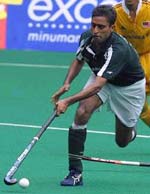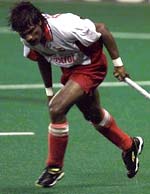Top finishers a class apart
M M Somaya
 It needed no crystal ball to predict the top three finishers even before a single whistle
was blown at the hockey World Cup 2002.
It needed no crystal ball to predict the top three finishers even before a single whistle
was blown at the hockey World Cup 2002.
Playing well is the domain of many. Playing well when it
really matters is the domain of but a few. Germany, Australia
and the Netherlands emphasised this once again at Kuala Lumpur and
deservedly captured the top three positions.
 Two decades has seen hockey transform and evolve into a
completely different ball game but the top echelon has
remained unchanged. There have been few better examples of
ruthless professionalism and unflinching work ethic.
Two decades has seen hockey transform and evolve into a
completely different ball game but the top echelon has
remained unchanged. There have been few better examples of
ruthless professionalism and unflinching work ethic.
At Kuala Lumpur the threat did persist. Asian giants Korea and Pakistan, till the very end, appeared most likely
to succeed in their bid to dislodge the top three. But when
in a corner, the big three were able to pull out that extra
bit of pace, a tucked away ploy and, of course, the killer
punch.
Korea came closest to causing a major upset when they
fought toe-to-toe with Germany in the semi-finals, and later
let the Netherlands off the hook after having them on the ropes
for most part of the bronze medal clash.
Deprived of a bronze by a last gasp equaliser and a
golden goal, Korea showed signs of establishing a permanent
place in the top echelons of world hockey.
 Pakistan rode on the guile of the mercurial Shahbaz Ahmed, a
ferocious half-line and some scorching penalty-corner
conversions. In the face of some controversial umpiring
decisions at critical times in the game against Germany, both
teams maintained their composure on the field though there
remained a residue and an unfortunate suspicion of bias.
Pakistan rode on the guile of the mercurial Shahbaz Ahmed, a
ferocious half-line and some scorching penalty-corner
conversions. In the face of some controversial umpiring
decisions at critical times in the game against Germany, both
teams maintained their composure on the field though there
remained a residue and an unfortunate suspicion of bias.
A few matches in World Cup 2002 would stay etched in
memory. The pool match between Germany and the Netherlands, which
witnessed breathtaking pace, both teams running at each other for the entire duration of the game and displaying skills of
sublime variety.
The semi-final between Australia and the Netherlands also set
up rip-roaring stuff, the Netherlands finding the typically open hockey of Australia, as well as the weather, too hot to handle.
Both matches epitomised the game as it exists in its
present avatar -- quick ball-rotation in defence, lightning
shift from defence into attack and dribbling skills at maximum
speed. The propensity to strike at goal from any angle once
inside the circle was also in evidence.
The final match too saw an exciting display of speed -- Germany keeping their best for the end, outmanoeuvering
Australia in the second half.
The 'no off-side' rule was introduced five years ago to
facilitate better flow and a glut of goals. Whether the end
objective has been met remains a matter of debate, but this
rule has certainly influenced the tactical outlook of teams.
It has in fact encouraged an overcautious approach and teams invariably push as many players as possible behind the
ball in defence. A defensive wall in front of the circle,
reminiscent of soccer, makes the entry into the circle by
dribbling extremely difficult.
Artistic build-up through stick skills and short passes
have therefore made way for long, sharp hits into the circle
searching for a deflection.
From inside the circle too, the strike across the face of
the goal to the far post and out of the reach of the
goalkeeper for a colleague to deflect home has become a very
effective route to a goal.
The World Cup winner for Germany also came off such a
move, with Oliver Domke sliding in to slot home. The grace and
languid elegance of the weaving dribble was only fleetingly
visible from players like Shahbaz, certainly a loss for
hockey.
Australia's Troy Elder, the Player of the Tournament, had
some stiff competition from some other outstanding performers, and his team mate Brent Livermore was just as outstanding in the central mid-fielder's role.
Top scorer Jorge Lombi of Argentina proved that age has
not dulled his flair as was the case with the exceptionally
gifted Shahbaz Ahmed, whose periodic bursts of stickwork kept
Pakistan in contention and gave the crowd great thrill.
Tien De Nooijer, the attacking mid-fielder from
the Netherlands, was just as pleasing and bore a lot of the
workload for his team.
Jamie Dwyer, the young forward from Australia, impressed
with his dash and ability to strike at goal. Wasim Ahmed, the
diminutive left-half of Pakistan has matured into an attacking
left-half and displayed poise even in tense situations.
For leadership and field presence, Florian Kunz stood
tall in Germany's deep defence though he may not have been
outstanding at all times.
In goal, Australia's Lachlan Dreher and Pakistan's
Muhammad Qasim were the pick of the lot.
 Baljit Dhillon and Dhanraj Pillay could have fallen into
the outstanding bracket with better support from their team
mates.
Baljit Dhillon and Dhanraj Pillay could have fallen into
the outstanding bracket with better support from their team
mates.
It was, however, good to see the younger players of the
Indian team, sponsored by Castrol, come good towards the end
of the tournament.
Hosts Malaysia need special kudos for superb organisation
of the gruelling 72-match tournament. The nine matches that
each team played in the 14-day tournament qualifies as
hockey's most gruelling test.
FIH President Elsvan Breda Vriesman's announcement of
reverting to the old 12-team format emanated from the harsh
experiences of both players and organisers and was met with
great relief.
The host team also managed a creditable eighth position
finish and kept the crowd always interested. There could be no
better ambience than an appreciative and disciplined crowd and
this was a feature of Kuala Lumpur 2002.
In a game where training technology is reaching
unbelievable levels, analysis and strategy have progressed
remarkably.
Coaches Bernhard Peters of Germany, Barry Dancer of
Australia and Paul Lissek, the coach of Malaysia, impressed
with the handling of their teams. India will have to make a
paradigm shift in this area if they have to seriously offer a
challenge.
Germany emerged deserving winners of World Cup 2002 as
were the other medal winners Australia and the Netherlands. They
have adapted continually to changes in hockey, always staying
a step ahead.
M M Somaya was a member of the Indian hockey team at the Olympics of 1980, '84 and '88.
Mail Sports Editor
|
Back to top
|
(c) Copyright 2000 PTI. All rights reserved. Republication or redistribution of PTI content, including by framing or similar means, is expressly prohibited without the prior written consent.
|

